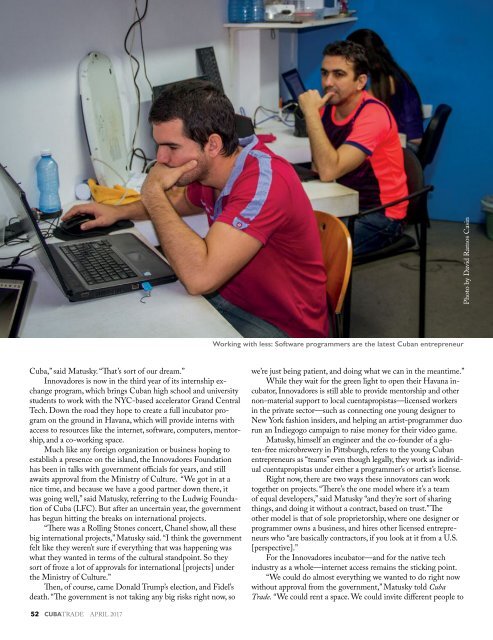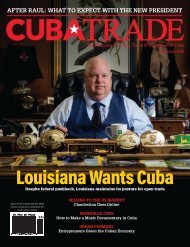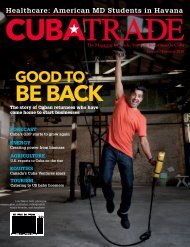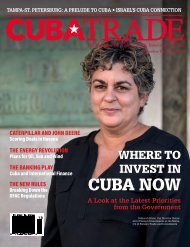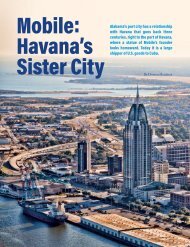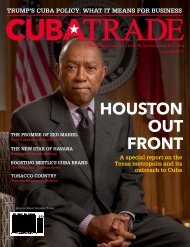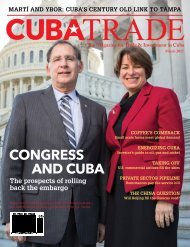CubaTrade-April2017-FLIPBOOK
You also want an ePaper? Increase the reach of your titles
YUMPU automatically turns print PDFs into web optimized ePapers that Google loves.
Photo by David Ramos Casin<br />
Photo by Thos Robinson<br />
Working with less: Software programmers are the latest Cuban entrepreneur Connecting through the Catholic church: John McIntire, chairman of the Cuba Emprende Foundation<br />
Cuba,” said Matusky. “That’s sort of our dream.”<br />
Innovadores is now in the third year of its internship exchange<br />
program, which brings Cuban high school and university<br />
students to work with the NYC-based accelerator Grand Central<br />
Tech. Down the road they hope to create a full incubator program<br />
on the ground in Havana, which will provide interns with<br />
access to resources like the internet, software, computers, mentorship,<br />
and a co-working space.<br />
Much like any foreign organization or business hoping to<br />
establish a presence on the island, the Innovadores Foundation<br />
has been in talks with government officials for years, and still<br />
awaits approval from the Ministry of Culture. “We got in at a<br />
nice time, and because we have a good partner down there, it<br />
was going well,” said Matusky, referring to the Ludwig Foundation<br />
of Cuba (LFC). But after an uncertain year, the government<br />
has begun hitting the breaks on international projects.<br />
“There was a Rolling Stones concert, Chanel show, all these<br />
big international projects,” Matusky said. “I think the government<br />
felt like they weren’t sure if everything that was happening was<br />
what they wanted in terms of the cultural standpoint. So they<br />
sort of froze a lot of approvals for international [projects] under<br />
the Ministry of Culture.”<br />
Then, of course, came Donald Trump’s election, and Fidel’s<br />
death. “The government is not taking any big risks right now, so<br />
we’re just being patient, and doing what we can in the meantime.”<br />
While they wait for the green light to open their Havana incubator,<br />
Innovadores is still able to provide mentorship and other<br />
non-material support to local cuentapropistas—licensed workers<br />
in the private sector—such as connecting one young designer to<br />
New York fashion insiders, and helping an artist-programmer duo<br />
run an Indiegogo campaign to raise money for their video game.<br />
Matusky, himself an engineer and the co-founder of a gluten-free<br />
microbrewery in Pittsburgh, refers to the young Cuban<br />
entrepreneurs as “teams” even though legally, they work as individual<br />
cuentapropistas under either a programmer’s or artist’s license.<br />
Right now, there are two ways these innovators can work<br />
together on projects. “There’s the one model where it’s a team<br />
of equal developers,” said Matusky “and they’re sort of sharing<br />
things, and doing it without a contract, based on trust.” The<br />
other model is that of sole proprietorship, where one designer or<br />
programmer owns a business, and hires other licensed entrepreneurs<br />
who “are basically contractors, if you look at it from a U.S.<br />
[perspective].”<br />
For the Innovadores incubator—and for the native tech<br />
industry as a whole—internet access remains the sticking point.<br />
“We could do almost everything we wanted to do right now<br />
without approval from the government,” Matusky told Cuba<br />
Trade. “We could rent a space. We could invite different people to<br />
come and work there. But as soon as you want to provide internet<br />
access, that’s where you really run into difficulty… You have to<br />
have explicit approval from the government, and then they want<br />
to know what you’re doing.”<br />
The Talent Pool Awaits<br />
Although the introduction of wifi hotspots and cuentapropista<br />
licenses have made it possible for a small entrepreneurial tech<br />
scene to exist in Cuba, the government’s cautious steps forward<br />
have not been enough to counter the global demand for skilled<br />
IT workers, which has lured talented computer scientists off the<br />
island for decades.<br />
In a conversation with Cuba Trade earlier this year, John<br />
McIntire, chairman of the Cuba Emprende Foundation, said<br />
that “a disproportionate number of people who have left in the<br />
last few years are people in their 20s and 30s who are computer<br />
programmers. They know their skills are employable, and they<br />
can earn a lot more money outside of Cuba.”<br />
McIntire’s Cuba Emprende Foundation has for years been<br />
raising money to support the Catholic Church of Cuba’s Proyecto<br />
Cuba Emprende, which trains potential entrepreneurs with<br />
the skills they need to run private businesses. So far more than<br />
2,000 students have gone through programs administered via<br />
the church, including many in the high-tech sector, with an eye<br />
toward remaining in Cuba.<br />
One U.S. employer who runs a small development team<br />
in Cuba describes a desperate “war for talented programmers”<br />
among the most advanced technological companies around the<br />
world. He believes Cuba’s pool of skilled techies is waiting to<br />
be discovered. “If you have a place like Cuba where there are<br />
talented people, the companies that could potentially hire them<br />
are going to find them.”<br />
The biggest concern, he says, is the lure of higher wages off<br />
island. “It’s bad there right now,” he added. “There’s a big gulf<br />
between the cost of living and wages. How much longer is it<br />
sustainable to pay people a dollar a day?”<br />
A History of High Tech<br />
Cuba’s private tech sector may be nascent, but it’s state tech sector<br />
is not. The government has a long history of training coders<br />
that goes back to the 1970s, when developers were busy creating<br />
programs for the sugar industry. At the time, Cuba hoped to improve<br />
its centrally run economy through cybernetics—the science<br />
of communications and automatic control systems—the same<br />
degree that young Innovadores interns are graduating with today.<br />
The severe economic collapse of the late 1980s left few<br />
52 CUBATRADE APRIL 2017<br />
APRIL 2017 CUBATRADE<br />
53


